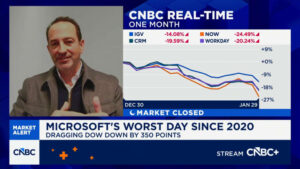Shares in NatWest Group (LSE:NWG) have been falling lately. Over the last month, the stock is down 9%, meaning it has a dividend yield of 5.16%.
That might make it look like I’d need to invest around £19,000 to earn £1,000 in annual passive income. But that’s not quite right – the actual figure is a bit lower.
Share buybacks
Dividends are one way that NatWest shareholders can earn an investment return. But they aren’t the only way the company returns cash to its owners.
Like a lot of banks, NatWest often engages in share buybacks. As a result, the number of shares outstanding has fallen from 11,083 at the end of 2017 to 9,929 at the start of this year.
Repurchasing stock does two things. It increases the value of the remaining shares, but it also lets shareholders generate passive income by selling part of their stake.
NatWest has reduced its share count by an average of 2.18% per year since 2017. A shareholder could therefore have sold 2.18% of their investment each year without diluting their stake in the business.
Adding this on to the current dividend yield takes the total passive income return available to shareholders to 7.34%.
At that level, the amount I’d need to invest to earn £1,000 a year in passive income isn’t £19,000. It’s actually 13,623.
Risks
Share buybacks are often infrequent and difficult to predict – even more so than dividends. But NatWest has done much more than other UK banks to reduce its share count over the last five years.
It’s worth noting, though, that over the last five years, NatWest have done a lot more to reduce its share count than other UK banks.
| Stock | Dec 2017 share count | Dec 2022 share count | % change |
|---|---|---|---|
| NatWest | 11,083 | 9,929 | -10.41 |
| Lloyds | 72,393 | 69,682 | -3.74 |
| Barclays | 17,284 | 16,867 | -2.41 |
| HSBC | 20,072 | 19,986 | -0.43 |
I think this makes NatWest especially attractive from a passive income perspective. But there are also some important risks to consider.
One of the distinctive features about the bank is that the UK government still owns around 62% of the company. I see this as a risk from an investment perspective.
Having the government as a major shareholder might make it difficult for NatWest to operate freely. In particular, it find itself unable to improve its efficiency by reducing staff in ways other banks can.
I don’t expect this to be an issue for the long term, though. The government has made it relatively clear that it intends to liquidate its stake in the bank, which should give it more flexibility in future.
Should I buy NatWest shares?
Dividend yields across the UK banks are all within 1% of each other. So I think that NatWest’s buyback activity makes it the superior choice when it comes to passive income.
My plan is to keep an eye on this stock for a bit. It’s a volatile time in the banking sector, so I’m going to see what the UK government does with its stake as I look for a buying opportunity.
This post was originally published on Motley Fool







